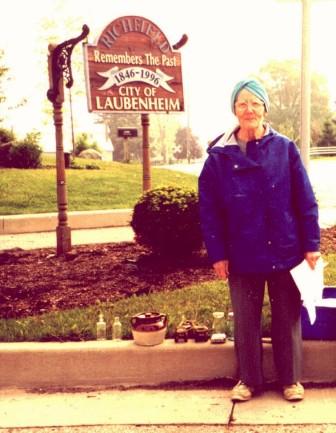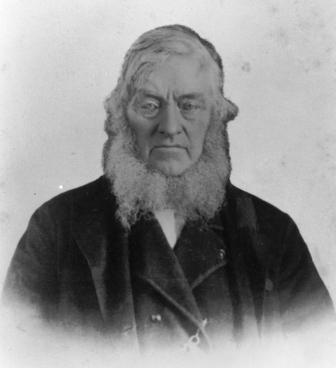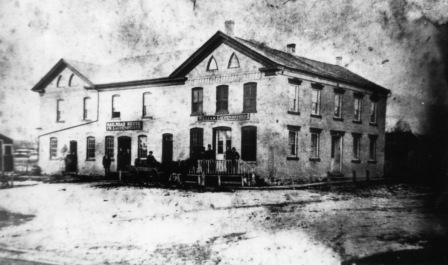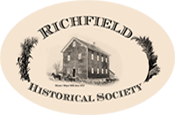City of Laubenheim
Early Richfield businessman almost had city named after him - Laubenheimer owned a general store, tavern among other businesses in the mid 1800s
Washington County Daily News (WI) - January 29, 2020
By Linda McAlpine
If the Washington County Board of Supervisors hadn’t intervened in 1859, Richfield might still be known as Laubenheim.
When what is now Richfield was established, it bore a shortened version
of the last name one of its earliest settlers, Johann Philipp
Laubenheimer, according to the book "Richfield Remembers The Past
1846-1996" by Barbara A. Nelson and Margaret S. Holzbog.
Naming the budding hamlet after Laubenheimer must have, at the time,
seemed like a no-brainer as it appears many of its earliest businesses
were owned by him, including a general store and tavern. But be that as
it may, the county’s Board of Supervisors "passed an ‘Order Vacating
the City of Laubenheim, Washington County,’ on Nov. 21, 1859 and
thereafter, the community was known as Richfield," according to the
Richfield history book.
 Laubenheimer was born on March 23, 1803, in Hesse-Darmstadt, Germany, a
son of Philip and Barbara Laubenheimer, according to the book "History
of Washington and Ozaukee Counties, Wisconsin," published in 1881 by
the Western Historical Company of Chicago.
Laubenheimer was born on March 23, 1803, in Hesse-Darmstadt, Germany, a
son of Philip and Barbara Laubenheimer, according to the book "History
of Washington and Ozaukee Counties, Wisconsin," published in 1881 by
the Western Historical Company of Chicago.
He married Gertrude Stark on June 9, 1824. The couple had at least
three children before they came to the United States in 1842. The
family settled in the area that was to be their namesake and later,
Richfield.
The Laubenheimer family’s trip to America was to pave the way for
several other families, according to the book about Richfield's
history. In it, it is noted that early in 1842, "members of the
Schowalter, Laubenheimer and Kessel families came together in the city
of Mayence, Rhine Hesse to talk over the proposition of sailing to the
New World. The Laubenheimers offered to start on the trip in the fall
of the year and prepare the way for the others to follow."
The family arrived in Wisconsin in October 1842, having traveled from
New York via the Great Lakes and through Milwaukee before settling in
Washington County.
According to the Richfield book, the Laubenheimer family spent their
first couple of weeks camping under some trees where Philip would later
build a house. They were the first white settlers in the area, the book
noted.
Tragedy struck the family just a short time after arriving in the area,
as Laubenheimer’s wife, Gertrude, and one child died in December 1842.
Laubenheimer married again a few years later, taking for his wife Mrs.
Anna Margaret Reiss, a native of Germany, the widow of John Reiss and
daughter of George Arnet. Several children were born of this second
marriage.
Laubenheimer built a block home to house his growing family. The building also served as a tavern and general store.
"He kept a very primitive stock of goods, consisting of pins, coffee
and sugar. Philip added to his house from time to time and it became a
grand place of rendezvous for all German immigrants who came in search
of lands," the Richfield book stated.
"He was one of the earliest of the pioneers and his old block house was
always a popular stopping place for travelers and land hunters,"
according the book about the county’s history.
In 1855, when the LaCrosse & Milwaukee Road Railroad was being laid
out, Laubenheimer and his second wife gave the railroad the right of
way over their lands for the fee of $1. It proved to be a smart deal.
In the mid-1860s, Laubenheimer built a large brick store on the south
side of the railroad tracks "from which he ran a large mercantile
business," according to the Richfield book.
His business empire included a grain elevator, the Railroad Hotel, also
 known as the Laubenheimer Hotel, behind which was the Laubenheimer
orchard or grove where public picnics were held, and a bowling alley.
known as the Laubenheimer Hotel, behind which was the Laubenheimer
orchard or grove where public picnics were held, and a bowling alley.
The bowling alley, according to the Richfield book, was housed in a
building that fronted onto the railroad tracks and was 14 feet wide and
60 feet long for "duck pin bowling."
In addition to being a successful businessman who had a town named
after him, at least for awhile, Laubenheimer evidently had some
connections with other movers and shakers of the day.
The Richfield book mentions that in the early days of settling in the
area, Laubenheimer "was an intimate friend" of Solomon Juneau, one of
the founders of Milwaukee who "visited him frequently and is said to
have shielded him from the Indians who were numerous during the early
years of settlement."
"Mr. Laubenheimer was an active farmer and a careful businessman who
commanded the respect and confidence of his neighbors and
acquaintances," is how the county history book sums up Laubenheimer’s
life in Laubenheim/Richfield. He died on Oct. 7, 1878. He is buried in
the Laubenheimer Family Cemetery on Highway 175 and Elm Street,
Richfield.
Washington County Daily News (WI) - January 29, 2020
By Linda McAlpine
Hope you enjoyed this story
Enjoy our other stories

